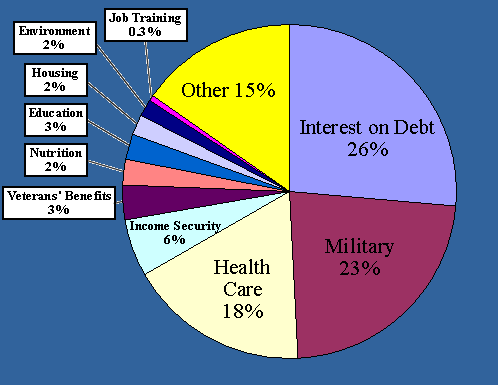Translation to
Arabic | Translation
to most European Languages
1) A war on Iraq is likely to cost $100 billion
(National Priority Project)
2) American Academy of Arts and Sciences Says Iraq War Could
Cost $1.9 Trillion (Assoicated Press)
How your 2001 federal income tax dollars
are spent with
(From: National Priority Project)
 |
See Also:
Anti-War Protests | Military
Situtation
1) A war on Iraq is likely to cost $100 billion
From: National Priorities Project (NPP)
http://www.nationalpriorities.org/iraq.pdf
Experts, including Senator Joseph Biden, Chair of the Senate Committee on Foreign Relations, indicate that the war may cost as much as $80-$100 billion. The 1990-91 Gulf War cost $61 billion, according to the Department of Defense. That's almost $80 billion in today's dollars. In this case, the administration policy is for a change of regime, suggesting the possibility of a longer, more involved and more costly war.
Rebuilding Iraq is likely to cost at least $50 billion.
Different experts weighed in on reconstruction efforts during the recent
Senate hearings on Iraq. According to Samuel Berger, Senior Foreign Policy
Advisor during the Clinton Administration, estimates for re-building the
Iraqi economy range from $50-$150 billion. Scott R. Feil, retired colonel
and expert on post-conflict reconstruction, argued that significant material
and personnel resources would be required for reconstruction. Just the security
forces alone would entail 75,000 personnel in the first year, amounting
to $16.5 billion. At least 5,000 troops would have to remain in place for
5-10 years, costing over $1 billion a year. Beyond security, the U.S. would
be expected to make a significant contribution for humanitarian and emergency
aid, a transitional administration, civil service and other components of
reconstruction. Feil estimated that these non-security costs would amount
to $15-$25 billion over the next decade.
United States citizens would have to pay for the vast majority of the war.
The U.S. had much international support during the Gulf War. Allies picked
up almost 90% of its cost. However, this war does not have international
support. Many allies have made it clear that they are not in favor of a
preemptive strike. Germany and Saudi Arabia, among the largest cash and
in-kind contributors to the Gulf War, have indicated their complete opposition
to an invasion. The U.S. people should expect to pay for most of the war
as well as reconstruction.
Also:
Find out how your 2001 federal income tax dollars are spent with NPP's Interactive
Tax Chart:
http://www.nationalpriorities.org/taxes/IncomeTaxChart.html
2) Study: Iraq War Could Cost $1.9 Trillion
By SIOBHAN McDONOUGH
.c The Associated Press
WASHINGTON (AP) - In the worst case, a war with Iraq could cost the United States almost as much as the government spent in the last budget year - nearly $2 trillion, according to new projections.
Researchers concluded in a study released Thursday that war with Iraq could cost the United States from $99 billion to more than $1.9 trillion over a decade.
The lower figure assumes a successful military, diplomatic and nation-building campaign; the higher figure assumes a prolonged war with a disruption of oil markets and a U.S. recession, the authors say in a study by the American Academy of Arts and Sciences.
Both figures assume a U.S. involvement in the country for 10 years.
White House spokesman Gordon Johndroe said it was premature to comment on cost estimates.
``War is the last resort,'' he said. ``We're hoping for a peaceful solution.''
The 1991 Persian Gulf War cost America an estimated $61 billion, but allies reimbursed all but about $7 billion. By some accounting methods, the United States may have even made a profit.
Direct military spending could range from $50 billion in a short campaign to $140 billion in a prolonged war with Iraq, said the study titled, ``War With Iraq: Costs, Consequences and Alternatives.'' The study was done by the academy's Committee on International Security Studies.
The report cautioned that aside from the estimates of direct military costs, all the numbers should be ``regarded as informed conjecture.''
Occupation and peacekeeping costs could be $75 billion in the best case to $500 billion in the worst, the study said. Reconstruction and nation-building costs are estimated at $30 billion to $105 billion, and humanitarian aid at $1 billion to $10 billion.
Economic ripples of war with Iraq are likely to spread beyond budgetary
costs, with the prospect of raising the cost of imported oil, slowing productivity
growth and possibly triggering a recession, the report said.
A prolonged disruption of world oil markets could cost the U.S. economy up to $778 billion, the researchers estimated. On the other hand, Iraq's huge oil resources could satisfy U.S. needs for imported oil at current levels for almost a century and otherwise benefit the economy by $40 billion.
A short war could actually benefit the United States in terms of its macroeconomic impact, which includes employment, by $17 billion. A long war, in contrast, could have a $391 billion negative effect.
The American Academy of Arts and Sciences, founded in 1780 and based in Cambridge, Mass., is an international society of scientists, scholars, artists, business people and political leaders.
On the Net:
American Academy of Arts and Sciences: http://www.amacad.org
12/06/02 03:02 EST